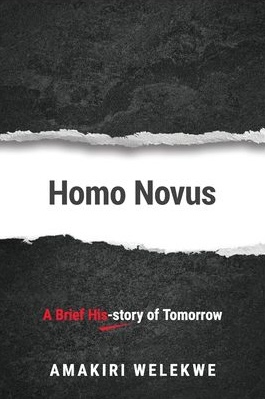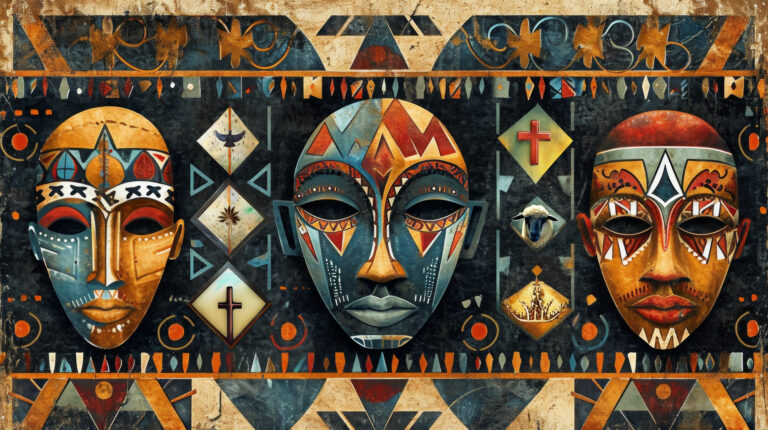Humans are shaped by stories. The challenge comes in living by the right one. One narrative has been dominant over much of modern history. It’s basically a story of progress, an ever-progressing rise from the supposed backwardness of traditional thinking and practices into a bright, secular, and prosperous future, with limitless possibilities. And at the centre of this onward march is the power of technology. Homo Novus: A Brief His-story of Tomorrow, by Amakiri Welekwe, is a call—nay an alarm—to be more aware of the subtle ways in which we’re sucked into that false story of redemption, driven by technology. For that story ultimately impoverishes humanity and dishonours God.
Our World Is Full of Competing Stories
Despite all the scientific and technological concepts introduced or addressed in Homo Novus, the book is delightfully accessible. For Welekwe writes with a deep concern not only to explain current trends but to warn believers of the dangers.
The book is built on the foundational biblical story: creation. God established his universe and placed humanity as his representatives to rule over it righteously. But we all know the story didn’t end there. Next, came the tragedy of the fall. Humanity descended into a state of rebellion, which it currently inhabits. Yet, starting with a promise in Genesis 3:14-15, God redeemed humanity through the life, death, and resurrection of Jesus.
Homo Novus contrasts this story with the popular secular approaches that envision the evolution of a new human species. God has a plan for humanity. But many in our technological age have another; a very different one. But how can we navigate our current terrain without embracing those false stories? How can we discern the truth and glorify God, avoiding the lies around us? Homo Novus seeks to answer those questions.
The False Promises of Yesterday
Humanism is the dominant story of our age. This is the rationalist outlook that attaches prime importance to human, rather than divine or theistic, concerns. All of life is understood and lived from the point of view of humans rather than any god. So while humanism may not totally reject God or religious belief, it values him only to the extent that God furthers the welfare of human beings.
Right from the early modern period (early 1500s to 1700s), and coinciding with the development of modern science, the humanist worldview has increasingly taken centre-stage across the world. In public discussions—politics, economics, law, science, education, and business—God is irrelevant. Humanity is everything. And this belief was expected to foster profound prosperity for all people.
Across the world people are exploring not only how to get humans to live better, but to live forever.

Homo Novus: A Brief His-story of Tomorrow
Amakiri Welekwe
If you are concerned about where our high-tech society is heading, this is one book you would want to read. Yes, we are making great strides in technology—frighteningly so, with the rapid digitalization of all things and the rise of artificial intelligence (AI). As privacy continues to erode, one may well wonder whether we have surrendered our souls to the machines.
Humanity is at a critical moment in history. Our species faces the potential risk of extinction and the rise of a new human species that threatens to replace the current one or become the dominant one. In this thoroughly researched book, the author addresses these concerns by examining history from God’s perspective. Where is history headed and how will events ultimately pan out in the end?
However, after three centuries of experimentation the world encountered the hollowness of humanism. We’ve become increasingly conscious of our limitations. As Welekwe notes, “Our achievements are characterised by materialism without morality, beauty without purity, wealth without wisdom, and lust without love” (p79). This is nothing but an illusion of progress.
Unfortunately, humans turn everywhere but to their Creator for his solution to their problems. We’re desperate to reinvent (redeem?) ourselves. There’s everything from bioengineering to cybernetic upgrades, and even mind uploads. Across the world people are exploring not only how to get humans to live better, but to live forever.
Our Desire for Transformation
And this is where the kind of story we tell really matters. For at the centre of the Christian story is the vision of a transformed humanity. As Welekwe writes: “We were all born Homo sapiens. Our old bodies came to us from the earth through Adam. Through our Creator God, Adam was the first man of the Homo sapiens species and through our Creator God again, we can become Homo novus. Our new body will come to us from heaven through Jesus, the first man of the Homo novus species” (p136).
God is already at work. He’s transforming humanity. In fact, this began from the moment we fell into sin, long before our intellectuals and thinkers latched onto the idea. He’s transcending our fallen limitations (both physical and moral) by forming a new man after the likeness of God (Ephesians 4:24).
God is transcending our fallen limitations by forming a new man after his likeness.
This is why Paul writes, elsewhere, about the resurrection: “What is sown is perishable; what is raised is imperishable. It is sown in dishonour; it is raised in glory” (1 Corinthians 15:42-43). These verses contain the grandest hopes of any secular trans-humanists. For God himself will clothe us with an undying body (1 Corinthians 15:44). We need not look to some intellectual or corporation to sell us that dream.
Sadly, the world rejects God’s proposal. Why? Because it comes at a cost, even though it is monetarily free. What cost, then? Simply laying down our pride and obstinacy (John 5:39-40); acknowledging that we’re fools and in need of God’s wisdom (1 Corinthians 3:18-19).
Hope for the Future
As one Old Testament prophet saw centuries ago, God’s kingdom is already on the move and it will crush every great empire (Daniel 2). Welekwe argues in Homo Novus that this refers to the second coming of Christ (p175). But it can be argued that this already began at the first coming of Jesus. Nevertheless, we look forward to the final triumph of God’s kingdom, when his glory will fill all the earth, and Jesus will stand as its head.
Naturally, the world won’t stand by as God seeks to establish his kingdom. Thus, as Welekwe points out using scripture, we can expect the emergence of a final world superpower in opposition to God. This is believed to be a revived form of the Roman Empire. I think some of the specifics are debatable and Christians have had a wide variety of opinions on the events of the last days, while maintaining the central theme of faith in the coming of God’s kingdom.
The rapid innovations in technology quickly desensitise us to the greater battle that’s raging.
Thus we should be wary of the mystery-decoder approach to Bible reading. “Let me begin by saying that the identity of the beast is not really something anyone should focus their attention on at this stage because it is still an unfolding story. When the time is right, his identity will be disclosed, and everything will become clear. What matters more is what system you give your allegiance to here and now in the run-up to the end. Is it to be the world system based on the one world new order or God’s eternal kingdom? (p186).
And that’s really the challenging question of this book: which system do we align with? Which story do we believe?
Yesterday, Today, and Forever
Homo Novus would’ve profited from the distinct insights of a Reformed outlook, especially in considering the sovereignty and majesty of God; the nature of the fall; and the outworking of God’s plan of redemption, among other themes. That being said, Welekwe draws on a wide variety of scholars and apologists. These include N. T. Wright, John Lennox, John Walton, and David Pawson.
God holds sway over both today and tomorrow.
The rapid innovations in technology quickly desensitise us to the greater battle that’s raging. So, as Peter warns God’s people, we must be vigilant (1 Peter 5:8). There is an ongoing conflict of worldviews and stories, systems and futures. This calls for spiritual discernment, which is itself a fruit of walking closely with God.
This God is the one we’ve embraced and to whom we must remain committed, if we’re in Christ. He is a king. Victorious. And he holds sway over both today and tomorrow, the present and the future. History is, indeed, his story. We can depend on him.














